Guaranteed Delivery
by Mother’s Day
on orders placed through May 2
Guaranteed Delivery by Mother’s Day
on orders placed through May 2
on orders placed through May 2
on orders placed through May 2
SAVE 15% OFF your order
(Use code LOVE)
FREE SHIPPING when you spend $100 (Continental US Only)
FREE 9″ Beech Bowl when you spend $150 (Use code SPRING)
SAVE 15% on all orders (Use code LOVE)
FREE SHIPPING when you spend $100 (Continental US Only)
FREE 9″ Beech Bowl when you spend $150 (Use code SPRING)
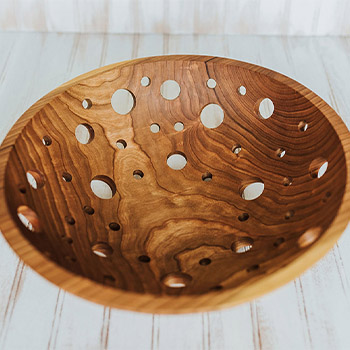
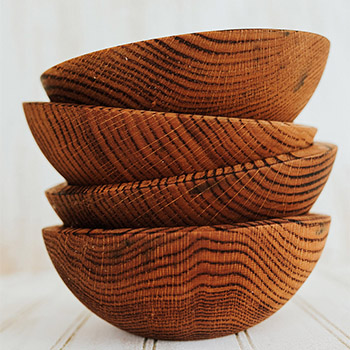
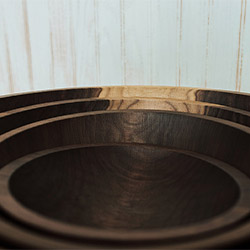
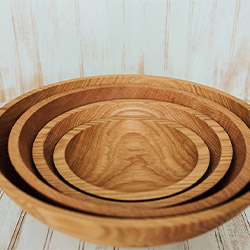
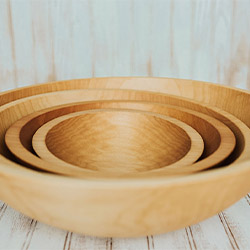
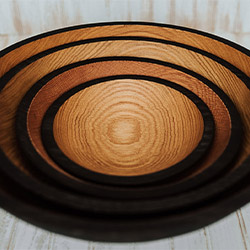
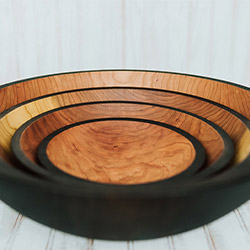
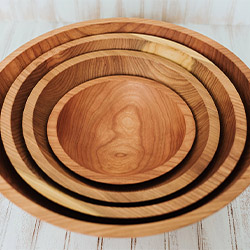
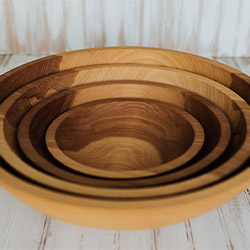
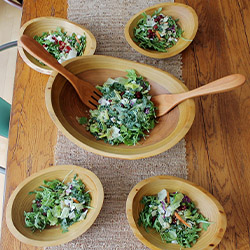
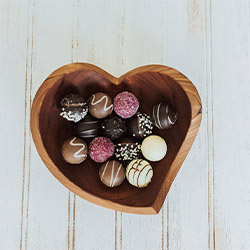
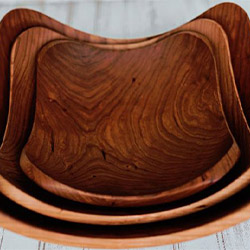
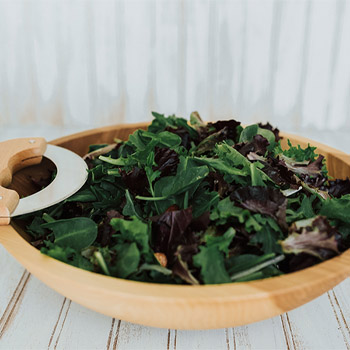
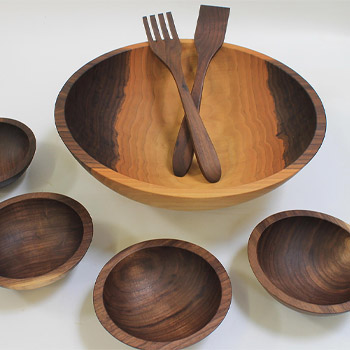
Share
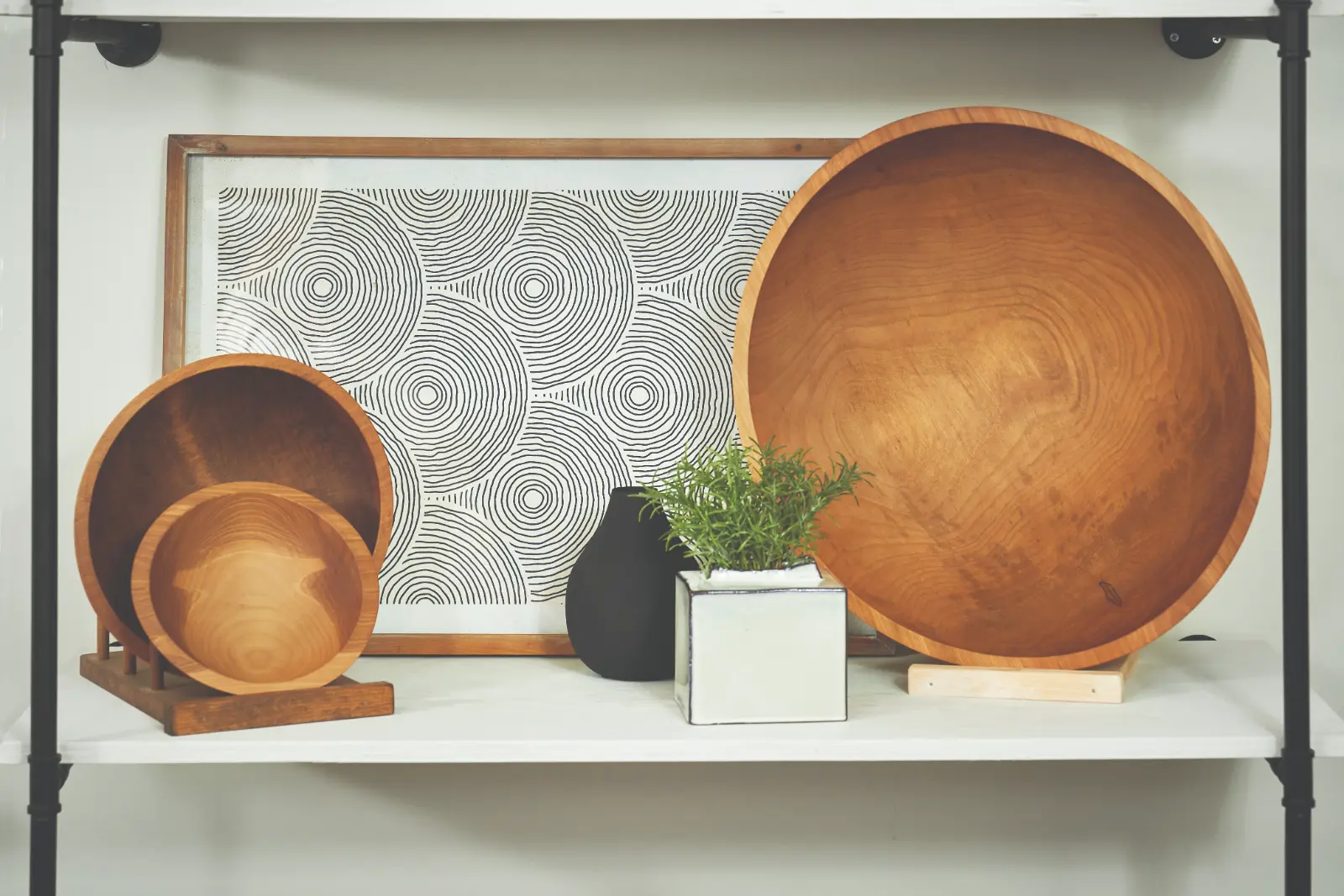
You may be hesitant to use wooden utensils and bowls for fear of them harboring bacteria and being difficult to clean. However, when it comes to safe food utensils and bowls, the type of wood matters.
Choosing the right wood can ensure that your kitchen tools are not only safe for use with food but also durable and long-lasting. As you consider the best woods for food utensils and bowls, you’ll want to know which ones are not only safe but also versatile and easy to maintain.
So, which woods make the cut?
Wood types that are commonly recommended for food utensils and bowls include maple, cherry, walnut, and olive wood. These woods are known for their durability, resistance to bacteria, and ease of cleaning. Additionally, they add a touch of natural beauty to your kitchen tools. Remember to avoid woods that are porous or prone to splintering, as they can harbor bacteria and be difficult to clean thoroughly. By choosing the right wood for your utensils and bowls, you can enjoy safe and reliable kitchen tools for years to come.
Maple wood provides a natural and durable option for crafting safe and reliable food utensils and bowls. Its sustainability and eco-friendliness make it an attractive choice for those who value environmentally conscious products. The maple tree is widely available and grows quickly, making it a renewable resource. Choosing maple for your kitchenware not only ensures its longevity but also minimizes its impact on the environment, giving you a sense of belonging to a community that values sustainability.
One of the most appealing features of maple wood is its unique color variations. Ranging from creamy white to light reddish-brown, the natural hues of maple add a touch of warmth and character to your kitchen tools and serving bowls. Each piece crafted from maple showcases its own distinct pattern, making it feel like an exclusive addition to your culinary essentials. This variety in color allows you to feel a sense of individuality and connection to the natural world, as no two pieces will ever look exactly the same.
Cherry wood offers a rich and elegant option for crafting food utensils and bowls, known for its deep, lustrous hues and fine grain. When it comes to the benefits of cherry wood, you’ll be pleased to know that it isn’t only visually appealing but also safe for food use. Cherry wood is naturally resistant to bacteria, making it a great choice for food utensils and bowls. Its tight grain structure minimizes the chances of food particles and liquids getting trapped, which is important for maintaining food safety.
In addition to cherry wood’s food safety benefits, it’s also known for its durability. This means that the utensils and bowls crafted from cherry wood can withstand regular use and washing without deteriorating quickly. This longevity makes cherry wood a practical and reliable choice for your kitchen essentials.
Furthermore, cherry wood possesses natural antimicrobial properties, adding another layer of food safety to the utensils and bowls made from this wood. This can provide peace of mind for individuals who prioritize the cleanliness and safety of their kitchen tools.
With its distinct rich color and fine grain, walnut wood presents another excellent option for crafting food utensils and bowls that prioritize both aesthetics and safety. When it comes to walnut utensils, you’ll find that they aren’t only beautiful but also durable and safe for use with food. The rich, warm tones of walnut wood can add a touch of elegance to your kitchen, making you feel connected to the heart of your home.
Caring for walnut bowls is essential to maintain their beauty and ensure their longevity. After each use, gently wash the walnut bowl with mild soap and warm water, then dry it with a clean cloth. To prevent the wood from drying out or cracking, it’s important to regularly condition the bowl with mineral oil or walnut oil. This simple act of care will help your walnut bowl maintain its luster and strength, allowing you to continue creating memorable meals for years to come.
Incorporating walnut utensils and bowls into your kitchen not only elevates the aesthetic appeal but also fosters a sense of warmth and belonging. The natural beauty and warmth of walnut wood can make you feel more connected to the food you prepare and the loved ones you share it with. Embrace the timeless elegance and practicality of walnut wood in your kitchen, and experience the joy of creating and sharing meals with those you hold dear.
Olive wood offers a unique and beautiful option for crafting safe and durable food utensils and bowls, with its distinctive grain and natural warmth. The benefits of using olive wood for your kitchenware are numerous. Not only is it a dense and sturdy wood, but it also possesses natural antibacterial properties, making it a safe choice for food preparation and serving. Additionally, the rich, warm tones of olive wood bring an elegant and organic feel to your kitchen.
Proper care is essential to ensure the longevity of your olive wood utensils and bowls. Here are some simple care instructions to keep them in top condition:
| Benefits | Care Instructions |
|---|---|
| Natural antibacterial properties | Hand wash only; avoid soaking |
| Durable and sturdy | Dry thoroughly after washing |
| A beautiful and unique grain | Rub with mineral oil to prevent drying out |
| Adds elegance to the kitchen | Avoid dishwasher and microwave |
Teak is an excellent choice for safe food utensils and bowls due to its natural antimicrobial properties. Its durability and strength make it a reliable option for kitchen tools that will withstand heavy use.
Additionally, teak’s beautiful grain patterns add a touch of elegance to your culinary experience.
Renowned for its natural antimicrobial properties, teak wood is a highly sought-after material for crafting safe and hygienic food utensils and bowls. Its ability to inhibit the growth of bacteria and fungi makes it an ideal choice for kitchenware.
Not only does teak provide a beautiful and durable option for food utensils, but it also offers peace of mind when it comes to safety and cleanliness in the kitchen. Additionally, teak’s sustainability adds to its appeal, as it’s grown in responsibly managed plantations, minimizing its environmental impact.
This means that you can enjoy the benefits of teak while also supporting eco-friendly practices. With teak’s natural antimicrobial properties and sustainable sourcing, you can feel confident in the safety and environmental consciousness of your kitchenware choices.
With its exceptional durability and strength, teak wood stands out as a top choice for crafting long-lasting and reliable food utensils and bowls. Teak’s sustainability makes it a responsible option for those who desire to use natural materials with minimal environmental impact.
The strength of teak wood ensures that the utensils and bowls crafted from it are resilient and long-lasting, providing you with dependable kitchen tools that will stand the test of time. Additionally, teak’s environmental impact is minimal as it’s a highly renewable resource with natural resistance to decay.
Appreciate the intricate beauty of teak wood’s grain patterns as they add a touch of natural elegance to your kitchen utensils and bowls.
Teak’s sustainable sourcing ensures that the wood is harvested responsibly, contributing to the preservation of forests.
The environmental impact of teak is minimal, as it’s a highly durable wood that requires minimal maintenance, reducing the need for frequent replacements.
The unique grain patterns of teak wood make each utensil or bowl a one-of-a-kind piece, adding a sense of individuality to your kitchen.
By choosing teak, you’re not only embracing the beauty of nature but also making an eco-conscious choice for your home.
Embrace the warmth and character of teak’s grain patterns, knowing that it’s a sustainable and environmentally friendly option for your kitchen essentials.
When it comes to safe food utensils and bowls, beech wood has unique properties that make it a popular choice.
You should consider the food safety aspects of using beech wood for utensils and bowls, as it’s important to ensure that the material is suitable for contact with food.
Beechwood utensils and bowls are known for their durability and versatility, making them a great option for your kitchen needs.
Beechwood, known for its durability and smooth grain, is a popular choice for crafting safe and reliable food utensils and bowls. Its sustainability makes it an eco-friendly option, while its natural color variations add a unique touch to each piece.
Beechwood comes in a range of hues, from light creams to reddish-browns, allowing you to find the perfect match for your kitchen aesthetic. The wood’s sustainability ensures that your utensils and bowls aren’t only safe for food but also environmentally conscious.
With its smooth grain and natural variations, beech wood products bring a sense of warmth and belonging to your kitchen, making you feel connected to the tradition of crafting and cooking.
Crafting food utensils and bowls from beech wood not only offers a durable and aesthetically pleasing option but also requires careful consideration of food safety aspects. Beechwood possesses excellent heat resistance, making it suitable for food contact items such as utensils and bowls.
Its natural density and fine grain help prevent moisture absorption, reducing the risk of harboring bacteria and odors. When properly maintained, beech wood can withstand frequent use and washing, ensuring food safety. However, it’s crucial to note that prolonged exposure to water can still cause warping or cracking, potentially compromising its food safety properties.
Therefore, it’s essential to dry beech wood utensils and bowls promptly after washing. By understanding these food safety considerations, you can confidently enjoy the benefits of using beech wood utensils and bowls in your kitchen.
You can rely on beech wood utensils and bowls for both durability and aesthetics in your kitchen. Beechwood is a sustainable material, making it an eco-friendly choice for your kitchenware. When properly cared for, beech wood utensils and bowls can last for years, adding a touch of natural warmth to your dining experience.
To keep your beech wood utensils and bowls in top condition, simply wash them by hand with mild soap and warm water. Make sure to dry them thoroughly after washing, and avoid soaking them or putting them in the dishwasher. To maintain their beauty, periodically apply a food-safe mineral oil to prevent the wood from drying out. With proper care, your beech wood utensils and bowls will continue to bring both functionality and charm to your kitchen for years to come.
Bamboo is a versatile and sustainable material suitable for crafting safe food utensils and bowls. When it comes to bamboo utensils, you can feel confident in their safety and eco-friendliness. Bamboo is widely known for its sustainability, as it’s one of the fastest-growing plants on the planet. This makes it an excellent choice for those who are mindful of the environment and seek products that align with their values.
Choosing bamboo utensils means opting for a material that isn’t only renewable but also biodegradable. This means that when your bamboo utensils have reached the end of their lifecycle, they’ll naturally break down without causing harm to the environment. By using bamboo utensils, you’re contributing to a more sustainable lifestyle and reducing your impact on the planet.
Additionally, bamboo sustainability extends beyond its growth speed. Bamboo forests require minimal maintenance, as they don’t need pesticides or herbicides to thrive. This not only benefits the environment but also ensures that the bamboo used in crafting utensils and bowls is free from harmful chemicals that could potentially leach into your food.
Incorporating bamboo utensils into your kitchen not only promotes sustainability but also brings a sense of connection to nature. The natural aesthetic of bamboo creates a warm and inviting atmosphere, allowing you to feel a sense of belonging to the environment. Embracing bamboo utensils means embracing a lifestyle that values both safety and sustainability.
A sustainable alternative to bamboo for crafting safe food utensils and bowls is hickory, known for its strength and durability. Hickory durability is one of its standout features, making it an excellent choice for food utensils and bowls that will withstand daily use in the kitchen.
When crafting food utensils and bowls, hickory’s durability ensures that your items will remain in excellent condition, even after frequent use and washing. The unique grain patterns of hickory also contribute to the aesthetic appeal of your kitchenware, providing a sense of character and warmth to your dining experience. With hickory, you can feel confident in the longevity and visual appeal of your food utensils and bowls, creating a sense of belonging and connection to your kitchen tools.
Crafting food utensils and bowls from acacia wood provides a durable and elegant option for your kitchen needs. Acacia wood, known for its strength and beautiful grain patterns, offers several benefits for your culinary tools and serving ware. Acacia wood is naturally resistant to water, making it less prone to warping or cracking compared to other types of wood. Its durability ensures that your acacia wood utensils and bowls will withstand the test of time, allowing you to enjoy them for years to come. Additionally, acacia wood exhibits antibacterial properties, making it a safe choice for food-related items.
When it comes to caring for your acacia wood utensils and bowls, it’s important to follow specific care instructions to maintain their quality. To clean acacia wood items, simply hand wash them with mild soap and warm water, then promptly dry them to prevent any potential damage. It’s best to avoid soaking acacia wood products or placing them in the dishwasher, as prolonged exposure to water can compromise the wood. Additionally, applying a food-safe mineral oil to the acacia wood periodically can help retain its natural luster and protect it from moisture. By following these care instructions, you can ensure that your acacia wood utensils and bowls remain in top condition, ready to elevate your kitchen experience.
So next time you’re in the market for safe and reliable food utensils and bowls, consider these top 10 woods:
These materials not only provide a beautiful and natural look, but they’re also durable and safe for food use.
Whether you’re cooking, serving, or eating, these woods are a great choice for your kitchen and dining needs.
All Holland Bowl Mill bowls come with a lifetime guarantee. If your bowl ever cracks or warps from regular use, Holland Bowl Mill will replace it with a new one of similar size and finish. Never let water stand in a wood bowl for a long period of time and never clean wood bowls or any wood product in the dishwasher. Holland Bowl Mill recommends using water and a small amount of mild soap to clean your wood products, then hand dry.
No appointment needed if group is under 10.
For larger groups, call 616-396-6513 to schedule your tour.
© 2023 Holland Bowl Mill